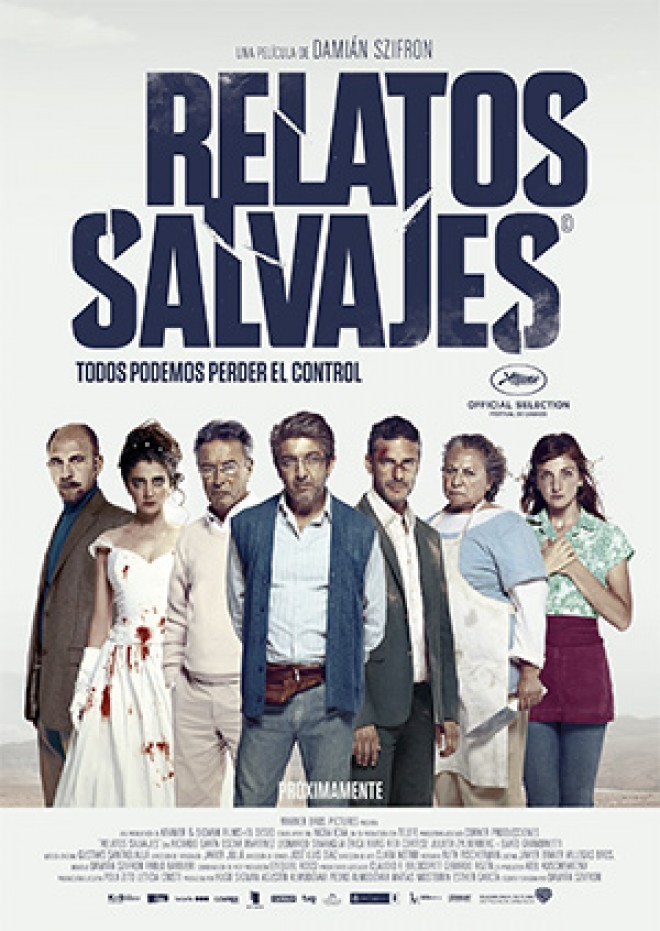“Crime of passion?”
Best. Wedding. Ever. And trip to the bureaucratic black hole that is government sanctioned towing. And expertly planned, faux fateful airline flight this side of“Lost”. I mean it. Damián Szifrón‘s Relatos salvejes [Wild Tales] is a twisted cousin of Krzysztof Kieslowski‘s The Decalogue, a sextet of darkly comic morality plays where chaos reigns and vengeance rewards the unhinged desperate for a win. From the hilariously absurd yet perfectly revealed machinations of its opening segment “Pasternak” to the vicious table turn of its last “Til Death Do Us Part”, you’ll be entertained with the physical manifestation of every amoral thought you’ve wished you had the guts to act upon in countless tiring situations throughout your life. It’s very cathartic in that way, providing the joyous release we could never afford in reality.
The best part of the whole comes from Szifrón’s unabashed tone. He isn’t projecting flawed characters in a mocking way for us to poke fun at in a mean-spirited “I know someone just like that” kind of way. He’s presenting over-the-top yet not so far-fetched situations instead. This way we’re able to both pity those involved and enjoy their warped ways of prevailing and/or failing without treating them as real people. Their actions and the predicaments they find themselves trapped inside are real but they’re heightened caricatures. This allows us to stay at arm’s length so the comedy of errors that ensues resonates above them. It’s entertainment after all, not some treatise on the evil of mankind preaching to us the tragedy of the world. We know that all too well.
Wild Tales is pure escapism, keeping us on our toes without the capacity to bore. That’s the beauty of an anthology work: each vignette isn’t afforded the time to wear out its welcome. Szifrón can distill every idea to its optimum form, cutting the fat to ensure only the minimal exposition necessary. He embraces cliché because he must. It gets his characters exactly where they’re heading. Coincidence and fate become part of the joke, a karmic farce we’ve all experienced from both sides. A guy like Simón (Ricardo Darín) doesn’t simply fall down a rabbit hole of injustice because of bad luck in “Dynamite”. He cultivated the temper and entitlement that supplied him the key over many years. The snowball effect of his actions is unavoidably contrived, but it feels authentic the entire way.
The same can be said for Moza (Julieta Zylberberg) in “The Rats”. Her entire life story has led her to the moment she can finally come face-to-face with the man who ruined it (César Bordón). How she reacts to her coworker’s (Rita Cortese) idea for payback proves a direct result of how she’s managed to pick up the pieces while Bordón’s Cuenca’s fate can thank decades of being a bastard for its end. In “The Strongest” both Diego (Leonardo Sbaraglia) and Mario (Walter Donado) have their egos to puff them up and set them off on a path towards destruction and “The Proposal” shows how greed and opportunism rules even the most heinous of hastily hatched plans born from love. In fact, every story included can be boiled down to victims of love’s scorn and money.
“Til Death Do Us Part” is a perfect example of these two things as well as a meticulously crafted example of how fast things can turn around on the backs of each. What begins as a raucous good time with the DJ blaring David Guetta and Sia onto the dance floor quickly devolves into a generic case of betrayal and the difficult decision the prospect of forgiveness provides. But Szifrón isn’t done there because he isn’t interested in generic, obvious, or normal. No, he’s shown from the first frame that subversion of expectations and going too far is his goal. He isn’t alone either. If you were truly honest with yourself, you’d imagine all six stories the same way. Because we covet our bloodlust internally, wreaking havoc on the world behind the fake smiles we share instead.
Our enjoyment cements Szifrón’s point that mankind is petty, vindictive, and above all else ruthless when it comes to survival. We don’t like to be cheated and we always strive to acquire eye-for-an-eye retribution whether it’s acted upon or not. We overreact to circumstances of the heart by drawing plans to ensure everyone who hurt us feels our pain just as we ignore remorse for dealing such sorrow until faced with identical consequences.Wild Tales may bring that punishment to its ultimate extreme, but why else would it use “wild” as its self-proclaiming adjective? Life is about cause and effect and things do not always come up roses. We like to believe there’s a balance between good and evil, but the truth is that the latter has been winning by a huge margin since the dawn of time.
As a result we can relate to victim and perpetrator, rendering the film ripe for repeat viewings to hop from character to character while basking in victory’s glory and languishing in the throes of defeat. The brevity of the segments allows for pointed commentary and abrupt climaxes to hit us over-the-head and refuse to feign apologies. You can’t get more on the nose and it’s so refreshing to acknowledge such. Szifrón has hit upon our universal hedonism and lust for superiority above our fellow man. He shows the pleasure that can be derived from playing God in devilish fashion before reaping the rewards of petty hate and void of empathy. It’s what we all wish we could be: not a saintly hero, but the kind of deadbeat who lives the highlife by being nothing of the sort.
Score: 9/10
Rating: R | Runtime: 122 minutes | Release Date: August 21st, 2014 (Argentina)
Studio: Warner Bros. / Sony Pictures Classics
Director(s): Damián Szifrón
Writer(s): Damián Szifrón

